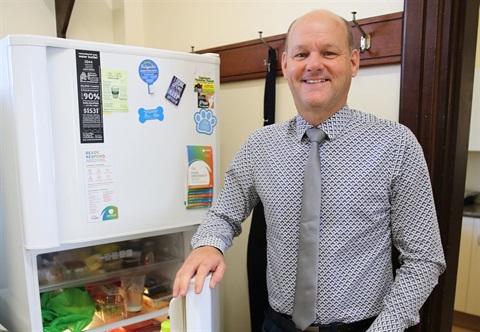Dollars and sense – how can you be food safe and savvy?
Published on 14 November 2023

As part of Australian Food Safety Week, held from 11 to 18 November 2023, Rockhampton Regional Council is urging the community not to compromise their health by taking food safety short cuts during the cost-of-living crisis.
Planning and Regulation Councillor Grant Mathers said although times are tough it is important to never risk your health.
“This year’s Australian Food Safety Week theme is ‘Food safety – dollars and sense’ and aims to help people manage the increased cost of living without compromising food safety,” Cr Mathers said.
“There are plenty of different ways you can make savings through reducing food waste and growing your own food while ensuring the food you and your family eat remains safe.
“There are an estimated 4.67 million cases of food poisoning in Australia each year that result in 47,900 hospitalisations, 38 deaths and cost to the economy of $2.1 billion, and we don’t want to see these stats in our local community.
“Food borne disease isn’t a minor illness but can leave you with long term effects such as reactive arthritis, which is why we like to remind residents on the importance of food safety.”
Follow these useful tips to stay food safe:
- Check the dates. You may be able to make savings by buying food, especially meat, close to its use by date. Just remember to use or freeze the food before its use by date. Foods with a best before date can still be eaten safely after that date but may have lost some quality or nutrition.
- Your freezer is your friend. Avoid food waste. Divide your meat or poultry into smaller portions in a container and freeze. Wash any fruit and vegetables and blanch in boiling water briefly before freezing. Beat eggs in small portions or freeze separated yolks and whites. Even milk and grated or whole blocks of cheese can be frozen.
- Cheaper meat is just as tasty. If you are moving to more economic cuts of meat such as mince, sausages, rolled roasts, liver and other offal and chicken, remember they need to be cooked to at least 75°C in the centre (using a meat thermometer).
- Seasonal fruit and veg. Look for fruit and vegetables that are in season as they are often cheaper and taste the best. Many retailers offer a cheaper price on fruit and veg that don’t look perfect. Minor blemishes aren’t a safety risk but don’t purchase green or sprouting potatoes which can contain toxins.
- Forget foraging. Don’t be tempted to forage for wild food as a saving. Mushrooms and some other plants that can look like food can be toxic and wild foods can be contaminated by soil and animal faeces as well as with dangerous microbes, parasites and chemicals.
- Don’t purchase food from unknown sources such as on social media, make sure you are buying from a legal food business to ensure food safety standards are followed.
If you need support, contact a food charity such as FoodBank, The Smith Family, Salvation Army or St Vincent de Paul Society and never ‘dumpster dive’ for discarded food which is likely to be contaminated by other rubbish or be past its use by date.
Learn more about food safety on the Food Safety Information Council website www.foodsafety.asn.au